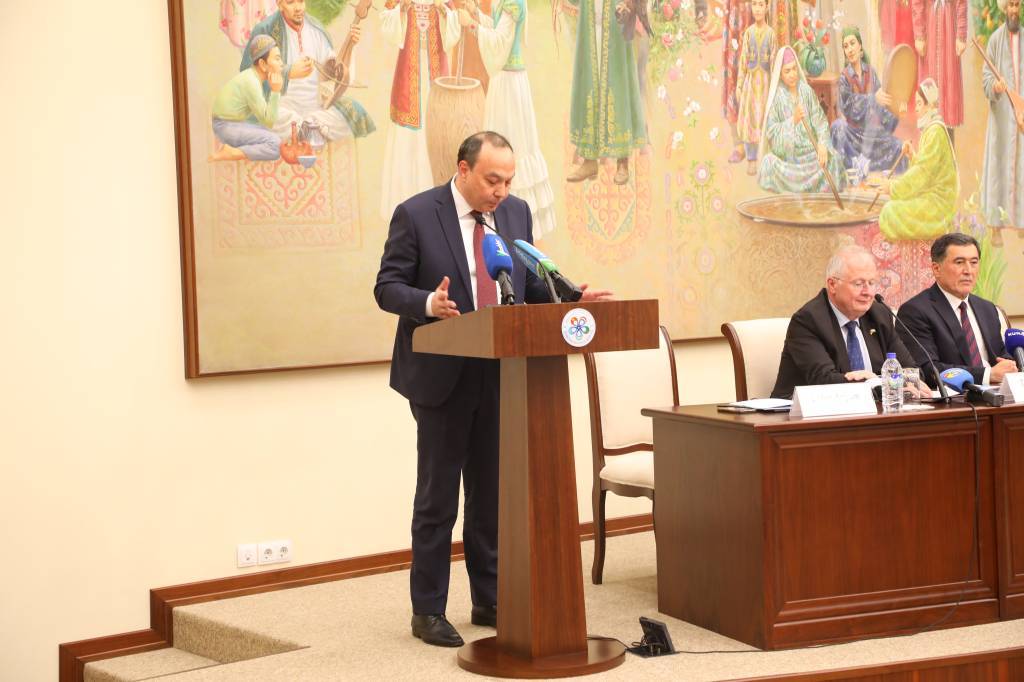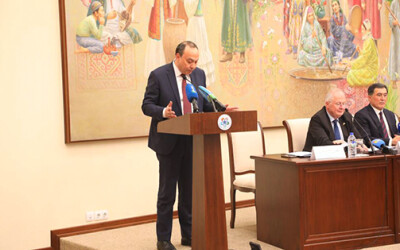Eldor Aripov: “Uzbek-German partnership reaches a new level”

Tashkent hosted a conference on “Uzbekistan – Germany: New horizons of cooperation”.
The event was timed to coincide with the visit of the President of Uzbekistan Shavkat Mirziyoyev to Germany.
The conference was attended by members of parliaments, representatives of the diplomatic corps, the business community, ministries and agencies of the two countries, as well as experts from leading analytical centers of Europe, the Middle East, Asia, and America, who arrived in Uzbekistan as observers for the upcoming referendum on constitutional reform.
Director of the Institute for Strategic and Regional Studies under the President of Uzbekistan (ISRS) Eldor Aripov outlined several promising areas of Uzbekistan – Germany interaction, based on the tasks arising from the renewed Constitution. He noted that Uzbekistan is interested in further maintaining and building up mutually beneficial cooperation with Germany.
The first is the improvement of good governance.
The renewed Constitution affirms the primacy of human rights and freedoms, to limit the lawlessness of power structures. The personal rights of citizens and democratic institutions are strengthened. Civil society institutions, citizens' self-governance bodies, and the mass media are elevated to the rank of equal partners of the state and given the right of public control over the activities of the executive branch and law enforcement agencies.
For the first time, to compensate for the damage caused to citizens as a result of illegal activities and the inaction of state bodies and their officials, the constitutional and legal duty of the state is adopted.
To achieve these goals, Uzbekistan is interested in studying Germany's experience of effective administrative reform, increasing the role of parliament, and strengthening the judicial branch of government to ensure human rights and freedoms.
We hope to expand the exchange of delegations in these areas, the implementation of relevant programs of technical assistance, and advanced training.
The second is interaction in the field of ecology and “green development”.
Within the framework of the renewed Constitution, environmental protection and the provision of environmental rights of citizens are defined as a constitutional obligation of all branches of government.
For the first time, the right of citizens to compensation for damage caused as a result of a violation of environmental legislation is established. By the way, this novel is a rare phenomenon even in the constitutions of developed democratic states.
Uzbekistan is ready to cooperate with Germany in the field of industrial cooperation based on the introduction of high environmental standards. This will increase the interest of German businesses in investing in Uzbekistan, which pays great attention to diversifying foreign economic relations and maintaining prudence in supply chains.
Taking into account the goal of Uzbekistan to bring the share of renewable energy to 30% in the country's energy balance by 2030, as well as Germany's best practices in the development of alternative energy, cooperation in the field of promoting the “green” agenda, the introduction of energy-efficient and resource-saving technologies is of great interest.
Third, cooperation in the field of education.
As part of the constitutional reform, the state supports non-state forms of education, guarantees academic freedom, freedom of teaching and scientific activities, and international scientific cooperation.
All this opens up new prospects for a mutually beneficial partnership with Germany. For Uzbekistan, where the population annually increases by 800 thousand people, cooperation in the field of vocational education, training, and professional development is of great interest.
According to Eldor Aripov, another important direction, which is declared a constitutional task, is the strengthening and development of friendly relations with neighboring states based on cooperation, mutual support, peace, and harmony. Germany’s experience in developing regional connectivity in trade, transport and energy is of great interest in this context.
Another priority for interaction should be Afghanistan, as the stability and security of neighboring countries, as well as other regions, depend on the peaceful and sustainable development of this land.
“The lessons we have already learned in the past should not be forgotten”, he emphasized. – We are convinced that only through a coordinated dialogue with the new Afghan authorities, including on issues of ensuring human rights, targeted socio-economic assistance, and involvement in regional economic ties, it is possible to create the necessary conditions to put that country back on the path of peaceful and sustainable development.
Following his speech, the ISRS Director noted that today, relying on mutual interest, a huge still unrealized potential, we have the opportunity to bring the bilateral Uzbek-German partnership to a fundamentally new level of cooperation.
And the expert communities of our countries can and should make an important contribution to this.
Next

Tashkent hosted a conference on “Uzbekistan – Germany: New horizons of cooperation”.
30.04.2023





